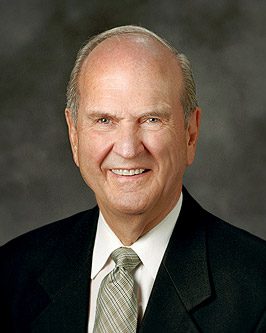
I posted an entry yesterday titled “Fidel Castro, Hugh Hefner, and Thomas S. Monson.” So I was bleakly amused to learn this morning — my thanks to Kyle Pratt for bringing it to my notice — that, over at The Daily Wire, Ben Shapiro has made essentially the same point that I did:
“The New York Times Proves It Hates Religious Americans With This Obituary”
Incidentally, unlike me Ben Shapiro isn’t a truth-hating Mormon apologist. He’s Jewish.
***
Newsweek has taken notice of the likely next president of the Church, offering a brief profile of him:
For what it’s worth, of course, technically speaking — and whatever happens when and if a new First Presidency is organized shortly after President Monson’s funeral — Russell M. Nelson already is, right now, the president of the Church.
Does everybody understand this?
When a Church president dies, the First Presidency that he led is dissolved as a quorum, and his counselors revert to the positions that they held prior to their entry into the First Presidency. In this particular case, Elders Eyring and Uchtdorf have returned to the Quorum of the Twelve Apostles, which now has thirteen members. (Recall that Elder Robert D. Hales died on 1 October 2017, and that his position in the Twelve has not yet been filled. So, even prior to President Monson’s death, the Quorum was operating with only eleven members. The return of Elders Eyring and Uchtdorf thus brings the membership to thirteen.) They assume the position in the quorum that accords with their apostolic seniority.
In any event, absent a First Presidency, the Quorum of the Twelve is currently the presiding quorum in the Church. And Russell M. Nelson, as the senior apostle and the president of the Twelve, is thus the presiding officer in the Church. Now.
In a speech on “Succession in the Presidency” given at BYU on 8 January 1974 (shortly, that is, after the passing of President Harold B. Lee), Elder Bruce R. McConkie recounted a story that has always impressed me:
“When President Lee passed he was attended by President Marion G. Romney, his second counselor, and President Spencer W. Kimball, the President of the Council of the Twelve. President N. Eldon Tanner was in Arizona at the time. Brother Romney, as the representative of and counselor to President Lee, was in complete and total charge at the hospital. He gave President Lee a blessing. He felt the spirit of peace and satisfaction, the calm assurance that whatever eventuated would be right. He did not promise President Lee that he would be healed. The President had become ill very rapidly, just in a matter of hours or moments. Shortly after this blessing, he passed away. At the moment he passed, Brother Romney, in harmony with the system and the established tradition and custom of the Church, stepped aside, and President Spencer W. Kimball was then in complete charge and had total direction. President Kimball was at that moment the senior apostle of God on earth. And as the last heartbeat of President Lee ceased, the mantle of leadership passed to President Kimball, whose next heartbeat was that of the living oracle and presiding authority of God on earth. From that moment the Church continued under the direction of President Kimball.”
Historically, when First Presidencies have been reorganized, the counselors in the previous First Presidency have typically — but not always — been called to serve in the new presidency. Strictly speaking, again, they haven’t been “retained,” since there is discontinuity, a gap, between one presidency and the next, but they have been called again. And, while new Church presidents have most commonly called as counselors the men who counseled their predecessors — the practical benefits of doing so are pretty obvious, as the learning curve is less steep — a new president is under no obligation or requirement to do so.











